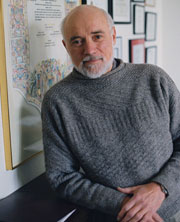 Dr. Portoghese was recruited to the Department of Medicinal Chemistry at the University of Minnesota in 1961. He was promoted to full professor in 1969. He also served as Director of Graduate Studies in Medicinal Chemistry from 1974 to 1986, as chair of the Department from 1974 to 1983, and as editor of the Journal of Medicinal Chemistry from 1972 to 2011.
Dr. Portoghese was recruited to the Department of Medicinal Chemistry at the University of Minnesota in 1961. He was promoted to full professor in 1969. He also served as Director of Graduate Studies in Medicinal Chemistry from 1974 to 1986, as chair of the Department from 1974 to 1983, and as editor of the Journal of Medicinal Chemistry from 1972 to 2011.
Interview Abstract
Dr. Portoghese begins part one of his interview with a review of his education at Columbia University and then the University of Maryland. He briefly discusses his military service in the Korean War, his Master’s work at Columbia, and then his move to the University of Wisconsin-Madison for doctoral work on cancer research. He then relates his recruitment to the Department of Medicinal Chemistry at the University of Minnesota in 1961 and his changing research interests in analgesic receptors. Dr. Portoghese then discusses his childhood interest in chemistry, relating several personal anecdotes, and how this led to his interest in pharmacy. He shares his recollections of the College of Pharmacy when he first arrived at the University in 1961, Lawrence Weaver’s tenure as dean, changes in the field of medicinal chemistry, and changes in the structure of the Department of Medicinal Chemistry over the course of his career at the University.
In part two of his interview, Dr. Portoghese offers his impressions of the creation of the Academic Health Center and the College of Pharmacy’s move to Weaver-Densford Hall. He discusses relations between the Department of Medicinal Chemistry and the Pharmacology Department, changes in concepts of intellectual property at the University, Dr. Robert Vince’s development of Ziagen, his own research on analgesic receptors, his continuous funding by the NIH, corporate interest in biochemical mechanisms, his development of different compounds as research tools, and industry support for drug research. He then discusses his time as chair of the Department of Medicinal Chemistry, administrative support for the Department, and his time as editor of the Journal of Medicinal Chemistry. He ends his interview with the major technological innovations that have revolutionized the way research in medicinal chemistry is performed.
Biographical Sketch
Philip Portoghese was born in Brooklyn, New York in 1931. He earned a bachelor’s degree in pharmacy from Columbia University in 1953. After graduating, he pursued graduate work at the University of Maryland. Four months later, however, he was drafted. He served in the Army for two years during the Korean War from 1954 to 1956. Upon completion of his service, Portoghese completed a Master’s degree at Columbia University in 1958. At the recommendation of his mentor, Portoghese pursued his Ph.D. at the University of Wisconsin. Though the University of Wisconsin awarded his degree, Portoghese completed his dissertation at the University of Kansas, having followed his advisor, Edward Smissman to Kansas. Dr. Portoghese was recruited to the Department of Medicinal Chemistry at the University of Minnesota by George Hagar, who Portoghese knew from the University of Maryland, in 1961. He was promoted to full professor in 1969. Dr. Portoghese arrived at the University with an NIH grant and has since been continuously funded through the NIH. Though his dissertation work was on anti-cancer research, Dr. Portoghese dedicated his career to research on analgesic receptors. His work on stereochemistry has led to paradigm shifting discoveries regarding multiple opioid receptor sites in the central nervous system. He has also designed highly selective opioid antagonists based on the message-address concept, many of which continue to be used as standard research tools. In addition to his research contributions, Dr. Portoghese also served as Director of Graduate Studies in Medicinal Chemistry from 1974 to 1986, as chair of the Department from 1974 to 1983, and as editor of the Journal of Medicinal Chemistry from 1972 to 2011.
Interview Transcript
PPortoghese.pdf